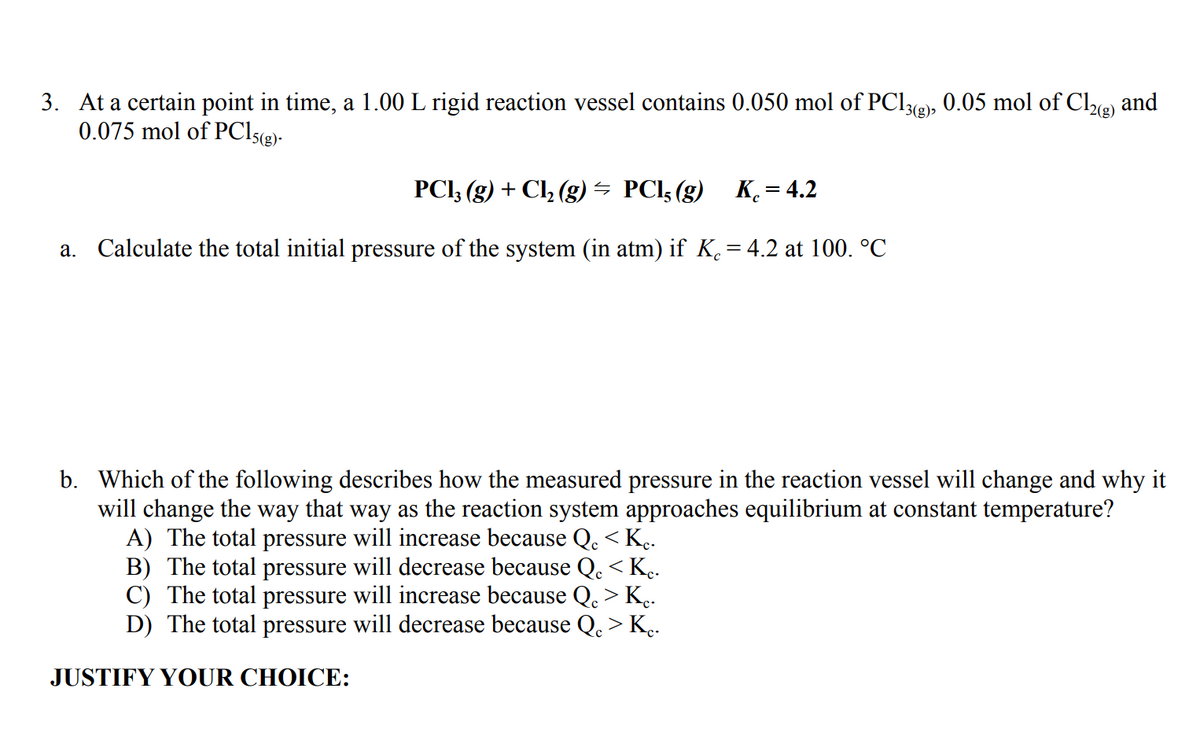3. At a certain point in time, a 1.00 L rigid reaction vessel contains 0.050 mol of PCl«@» 0.05 mol of Cl) and 0.075 mol of PCI5®)- PCI, (g) + Cl, (g) s PCI5 (g) K. = 4.2 a. Calculate the total initial pressure of the system (in atm) if K = 4.2 at 100. °C b. Which of the following describes how the measured pressure in the reaction vessel will change and why it will change the way that way as the reaction system approaches equilibrium at constant temperature? A) The total pressure will increase because Q. < K.. B) The total pressure will decrease because Q. < K.. C) The total pressure will increase because Q. > K̟. D) The total pressure will decrease because Q. > K.. く
3. At a certain point in time, a 1.00 L rigid reaction vessel contains 0.050 mol of PCl«@» 0.05 mol of Cl) and 0.075 mol of PCI5®)- PCI, (g) + Cl, (g) s PCI5 (g) K. = 4.2 a. Calculate the total initial pressure of the system (in atm) if K = 4.2 at 100. °C b. Which of the following describes how the measured pressure in the reaction vessel will change and why it will change the way that way as the reaction system approaches equilibrium at constant temperature? A) The total pressure will increase because Q. < K.. B) The total pressure will decrease because Q. < K.. C) The total pressure will increase because Q. > K̟. D) The total pressure will decrease because Q. > K.. く
Chemistry: The Molecular Science
5th Edition
ISBN:9781285199047
Author:John W. Moore, Conrad L. Stanitski
Publisher:John W. Moore, Conrad L. Stanitski
Chapter12: Chemical Equilibrium
Section: Chapter Questions
Problem 97QRT
Related questions
Question
Can you help me with this?

Transcribed Image Text:3. At a certain point in time, a 1.00 L rigid reaction vessel contains 0.050 mol of PCI3@), 0.05 mol of Cle) and
0.075 mol of PCI5(g)-
2(g)
PCI, (g) + Cl, (g) – PCI5 (g) K = 4.2
a. Calculate the total initial pressure of the system (in atm) if K.= 4.2 at 100. °C
b. Which of the following describes how the measured pressure in the reaction vessel will change and why it
will change the way that way as the reaction system approaches equilibrium at constant temperature?
A) The total pressure will increase because Q. < K..
B) The total pressure will decrease because Q. < K..
C) The total pressure will increase because Q. > K..
D) The total pressure will decrease because Q. > K.
JUSTIFY YOUR CHOICE:
Expert Solution
This question has been solved!
Explore an expertly crafted, step-by-step solution for a thorough understanding of key concepts.
This is a popular solution!
Trending now
This is a popular solution!
Step by step
Solved in 2 steps

Knowledge Booster
Learn more about
Need a deep-dive on the concept behind this application? Look no further. Learn more about this topic, chemistry and related others by exploring similar questions and additional content below.Recommended textbooks for you

Chemistry: The Molecular Science
Chemistry
ISBN:
9781285199047
Author:
John W. Moore, Conrad L. Stanitski
Publisher:
Cengage Learning

Chemistry for Engineering Students
Chemistry
ISBN:
9781337398909
Author:
Lawrence S. Brown, Tom Holme
Publisher:
Cengage Learning

Chemistry
Chemistry
ISBN:
9781305957404
Author:
Steven S. Zumdahl, Susan A. Zumdahl, Donald J. DeCoste
Publisher:
Cengage Learning

Chemistry: The Molecular Science
Chemistry
ISBN:
9781285199047
Author:
John W. Moore, Conrad L. Stanitski
Publisher:
Cengage Learning

Chemistry for Engineering Students
Chemistry
ISBN:
9781337398909
Author:
Lawrence S. Brown, Tom Holme
Publisher:
Cengage Learning

Chemistry
Chemistry
ISBN:
9781305957404
Author:
Steven S. Zumdahl, Susan A. Zumdahl, Donald J. DeCoste
Publisher:
Cengage Learning


Chemistry: An Atoms First Approach
Chemistry
ISBN:
9781305079243
Author:
Steven S. Zumdahl, Susan A. Zumdahl
Publisher:
Cengage Learning

Introductory Chemistry: A Foundation
Chemistry
ISBN:
9781285199030
Author:
Steven S. Zumdahl, Donald J. DeCoste
Publisher:
Cengage Learning